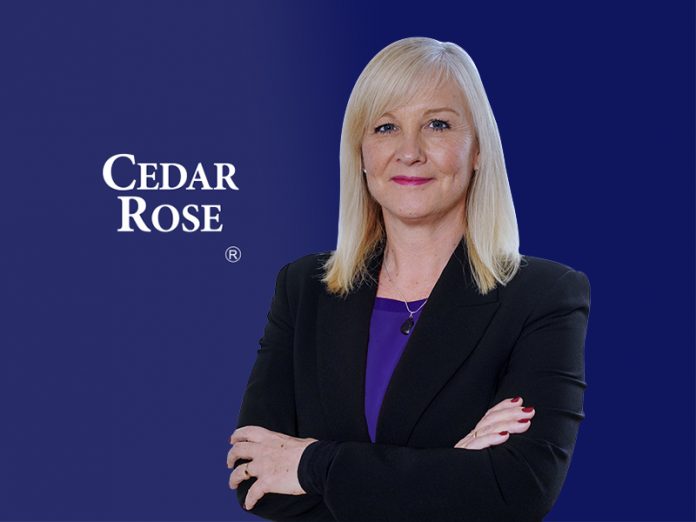An exclusive interview with Cedar Rose founder and non-executive director Christina Massaad
After helping kickstart digital transformation across the MENA region, Cedar Rose is now a mature company ready to thrive in a post-Covid business world. Founder Christina Massaad reflects on her 20 years at the helm, shares how to inspire future leaders and offers key lessons for managing a remote working team.
What key qualities set Cedar Rose apart and will help guide the company through this uncertain future?
I’m proud to say that Cedar Rose is a proactive, dynamic, innovative and agile business. For the past 20 years, my team has gathered and transformed data while building quality, reliable credit and compliance solutions for our customers. We love being provocative market disruptors by merging hard-to-reach data with artificial intelligence and machine learning to create new markets and services. We will keep investing in top-end translation technology and data standardisation to give us a unique multilingual, multifunctional database covering the Middle East, Africa and Asia. All this means we offer accurate global coverage for automated credit and compliance assessments.
This combination of innovation, future thinking and agility along with years of experience – including coping through several regional disasters – gives Cedar Rose the edge it needs to survive and thrive after this unprecedented global crisis.
Has the Covid-19 pandemic made it more difficult for Cedar Rose to collect data and identify trends?
Like most companies, we had to adapt. Cedar Rose has offices and people working remotely around the world. A large percentage of the team were based in Lebanon, which was suffering from street protests long before the pandemic started. So, they were accustomed to working from home already. Our Business Continuity Committee was regularly discussing crisis plans and preparing for disaster recovery. Robust forward planning and preparation has protected us through many crises including the 2006 war in Lebanon, lengthy power outages in Cyprus in 2011 and the economic crisis in 2013 – to name a few. We were prepared for the worst and had a committee to oversee the smooth switch to home working. Initially, working from home complicated our research and outreach since companies and government offices were often closed too. But within a few weeks most organisations had caught up. It also helped that much of our revenue now comes from online automated solutions which remained unaffected by the Covid crisis.
As for identifying trends, unprecedented events will always improve the predictive analysis since now there is historical data to build on. Sadly, according to several sources, climate change may help create more pandemics in the future, but each of us – governments, businesses and individuals – now have a better idea how to react next time.
Very generally, how did the pandemic impact your operations in the MENA region (Middle East, North Africa)? What lessons do you have for business leaders there?
It really depends on the country. For example, the pandemic exacerbated one of Lebanon’s worst economic crises. On the other hand, the United Arab Emirates handled the pandemic well. Even back in March 2020 when I last visited Dubai, there was already hand sanitizer near every lift or reception desk and visitors from high-risk countries were tested at airports.
Many MENA countries have rapidly advanced their digitalisation, e-commerce and compliance over the past year, but of course this also led to an increase in fraudulent behaviour. One lesson is that stricter compliance measures must be introduced alongside the introduction of any e-commerce, neo-banking and mobile payments technology. Thankfully, most MENA governments are now enforcing their anti-money laundering and counter-terrorism financing laws. That means business leaders must know to whom they are extending credit or making payments. It also pays to check if the ultimate beneficial owners or companies are located in high-risk countries or perhaps even sanctioned, red-flagged or politically exposed. A few years ago, automated checks weren’t available in the MENA region, but today KYC/KYB and credit and compliance checks are fast and cheap.
Has the Covid-19 pandemic made the MENA area more or less attractive for business? What sectors were most affected?
The worst affected sectors in MENA are the same as those affected everywhere – the travel and tourism, hospitality, leisure, health, fashion, beauty, manufacturing, real estate, construction, oil and gas, sports, automotive, transport and retail industries are all hurting. But some sectors are expanding unusually fast, such as insurance, e-commerce, digital advertising and data. Europeans might scratch their head about this, but consider that online grocery shopping is only about a year old in this region. Online services have quickly become a necessity for many, as have restaurant deliveries and takeaways. Smartphone app delivery and couriers are a big part of this boost.
What did the pandemic teach you about the future of business?
So many lessons! Any business owner or manager who has come through this experience will have learned a lot, and that will make them a better leader in whatever they do. We can never be over-prepared. We must always plan for the worst and strive for the best. That means planning ahead at least two or three years for your cash-flow, growth strategies and future project plans. In my opinion, a current cash-flow forecast is the most important business tool and can be done with a fairly simple Excel spreadsheet. It must always be based on a worst case scenario. You should have enough cash for a few months in case things are worse than imagined while you work to swiftly cut costs. On the plus side, a forecast lets you know when things are going well so you can afford to expand.
Another lesson is to stay within sensible credit limits and be firm with credit control. There is always a fine balance in keeping a good supplier-customer relationship and actually getting paid for supplies. Remember that a great customer relationship is worthless if you aren’t getting paid. Make sure the terms of agreement are clear from the start, enact a strict credit policy and tell your sales and finance teams about the customer terms. In most cases, accounts payable teams will prioritise paying any businesses that applies a late payment interest fee, or they will get on the phone to chase down an outstanding invoice. Don’t be afraid to be one of those businesses! Setting sensible credit limits is the main purpose of credit reports. They also reveal the risky customers and those with the greatest potential.
Do you worry that businesses may be focusing too much on Covid-19 and missing other factors?
Yes. Covid-19 will have a dramatic economic effect for at least another year. That means supplies might not arrive, companies may not get paid and some might even go into liquidation. All of these things cause a domino effect. Business leaders must take precautionary measures like getting good data about their customers and suppliers and keeping a close eye on their cash-flow. European businesses with a large exposure to the UK (and vice-versa) should be prepared for Brexit. This break-up of the economic union could not have come at a worse time for businesses on both sides of the Channel. Don’t let coping with Covid mean you are less prepared for other challenges like this.

Most people wisely treat Covid-19 as a threat. But do you see any opportunities arising out of this pandemic?
I do indeed. Positives are everywhere – if you know how to look for them. For example, prior to the pandemic, online grocery shopping was almost unheard of here in Cyprus and most restaurants lacked a delivery service. Many companies have since developed electronic ID, web development and marketing skills. They have also hired vehicles, delivery services, warehousing and logistics. Businesses like ours moved to 100% remote working and created fresh opportunities in IT, online training, project management, virtual offices and cloud servers. We ordered more deliveries from florists, couriers and gift hamper companies. I believe remote working will continue for many people in the long term which will bring a host of other profitable opportunities for both B2C and B2B businesses.
How has the pandemic changed the qualities it takes to be a good leader?
I think a leader needs to be firm, organised, consistent and proactive with a good degree of emotional intelligence. You won’t always get it right the first time, so a leader must admit mistakes and be prepared to quickly change tack. The pandemic has exposed indecisive and disorganised leaders and those who can act quickly and firmly. The numbers of virus cases and deaths in each country speak for themselves.
Emotional intelligence is now a critical leadership quality due to rise of remote work. Leaders must keep remote teams engaged and be careful to notice when staff are struggling with loneliness and depression or may be losing motivation. Employee engagement is tougher today, so it is much more important to get it right.
Are women well represented at the top echelons of your industry and among business leaders in general?
Women are fairly well represented across the business information industry, although most of the top managers are still men. That seems to be the case in most sectors. But over the last ten years, times are changing across the MENA region which tends to be way behind Europe in this issue. Yet if a woman does reach a high position, her pay may be lower than a man’s for the same role. This is something every company must address.
Do you think it is important for young women to have aspirational female role models like yourself who prove it’s possible to reach the top levels of business?
I believe women can be inspired by male role models just as much as by other women. But yes, there seems to be fewer female role models in business. Most business leaders I look up to are male, but I never saw that as a problem. What really matters is the example set by a role model. Having said that, the highest level of praise a member of my team can give me is that I inspire them. Inspiration goes both ways, though. I am often inspired by colleagues pushing themselves beyond expectations. We have many such people in our company, both male and female. Our company motto “Strive for Excellence” motivates us to become the best version of ourselves by hitting targets and developing new skills. Once you have that business culture, everyone can inspire each other.
Do you have any advice for women starting their careers?
Don’t be intimidated by anyone. If you think you are weaker because you are a woman, or for any other reason, then you are already disadvantaged. Be confident in your abilities – and if you are not confident then improve your skills or change jobs. Your managers and colleagues will respond positively to genuine and humble confidence. And if you believe in yourself, then it’s more likely your boss will trust you with greater responsibility over time. Confidence coupled with great performance can overpower discrimination and turn it into respect. I’ve seen it happen many times.
Is the MENA region being digitally transformed at the same rate as other parts of the world?
Digital transformation in the MENA region is happening at an even faster rate than in Europe or the US because the region was a long way behind. MENA countries are able to skip a lot of the early steps because the regulations, technology and data were already tested in developed countries over decades. The region has rapidly advanced its healthtech, agrotech, fintech and the entire tech family while embracing green energy to power them.
It’s a thrilling time to be based here. I’m proud that Cedar Rose several years ago helped to enable this digital transformation by developing expertise in gathering, translating, cleaning and structuring data for the region and making it available in real time to our clients around the world.
Many organisations are finding clear advantages to working remotely. What implications will this have for employee well-being if this trend continues beyond the pandemic?

While we should monitor employees’ mental health since they can’t socialise in person with colleagues, working from home has positive advantages as well. For instance, there is less peer pressure so the need to keep up to date with fashionable clothing, hair, shoes or even body weight is somewhat negated. This may seem trivial, but these issues can put a lot of mental pressure on young people especially. Remote working also creates less space for gossip and the formation of cliques. Employees are also happy about not spending hours in traffic or squeezed into public transport each day. This should give people less stress, less exposure to pollution, more money and more rest time.
Even without the pandemic, most people would still prefer the freedom of working from home because they can still socialise, go shopping, go to the gym or the soccer match in their free time. But since we can’t do most of those things now, it’s crucial for employers to regularly communicate with their staff to notice any mental health issues due to isolation. The “It’s okay not to be okay” message must be loud and clear so staff can reach out for help if they need it. Staff should also be encouraged to take enough rest time. Lockdowns and 12-hour workdays without regular breaks is a recipe for disaster in the long term. People must know it’s acceptable to switch on and off at the usual times, take days off and speak up when feeling overloaded.
Now that you are “taking a back seat” as non-executive director at Cedar Rose, what achievements are you most proud of and what are some of your biggest lessons so far?
I’m extremely proud to lead a socially responsible, diverse and reputable company. After 24 years in business, Cedar Rose is trusted by Fortune 500 businesses and the “Big Four” auditing firms. Considering that until recently we’ve covered one of the hardest regions for data – MENA – that’s a great accomplishment. Now that we have global coverage, the potential is so much greater and I’m very positive about the future of Cedar Rose.
It’s tough to choose the most important lessons. I’ve learned so much about perspective, marketing, business strategy and working among different cultures. But the most important lessons are to always be prepared for the unexpected, be aware and in control of your finances and never put too much trust in any one person. Some harsh lessons, sure. But with experience comes the wisdom to calmly deal with extreme situations, stay focussed and let go of issues that will only bring you down.
What future goals are you the most excited about reaching?
I’m currently writing a book about the adventures my husband and I have been through. We’ve had quite a few both in business and in our personal lives. I hope the story of a working-class girl from the London suburbs and a refugee from Lebanon who built a successful business to improve global security will help inspire others.
Apart from that I’m excited about the potential of this mature company which has such strong foundations. Cedar Rose is ready to start a new, much faster, more automated phase. Our investments in automated credit scoring and electronic ID are bearing fruit and the new CR Comply tool can complete research tasks in seconds rather than hours or weeks. It’s game-changing for our customers who can on-board clients at a fraction of the time and cost.
Finally, do you have a motivating message for aspiring leaders?
The world is at a turning point and it’s an exciting time to be alive. We have survived a difficult period and gained unique wisdom, strength and experience to pass on to future generations.
Leaders don’t need to be in the front of the pack to show the way. You can push from behind, support from below and sometimes just walk side by side. So, strive to be the best version of yourself and others will be inspired to follow you.
This article was originally published on 14 March 2021.
Executive Profile

Christina Massaad is a Non-Executive Director at Cedar Rose, having co-founded the group of companies with her husband, Antoun Massaad in 1997. Until the end of 2020, Christina was Managing Director at Cedar Rose and co-managed the operations of the company in the UK, Lebanon, Cyprus and UAE.




































